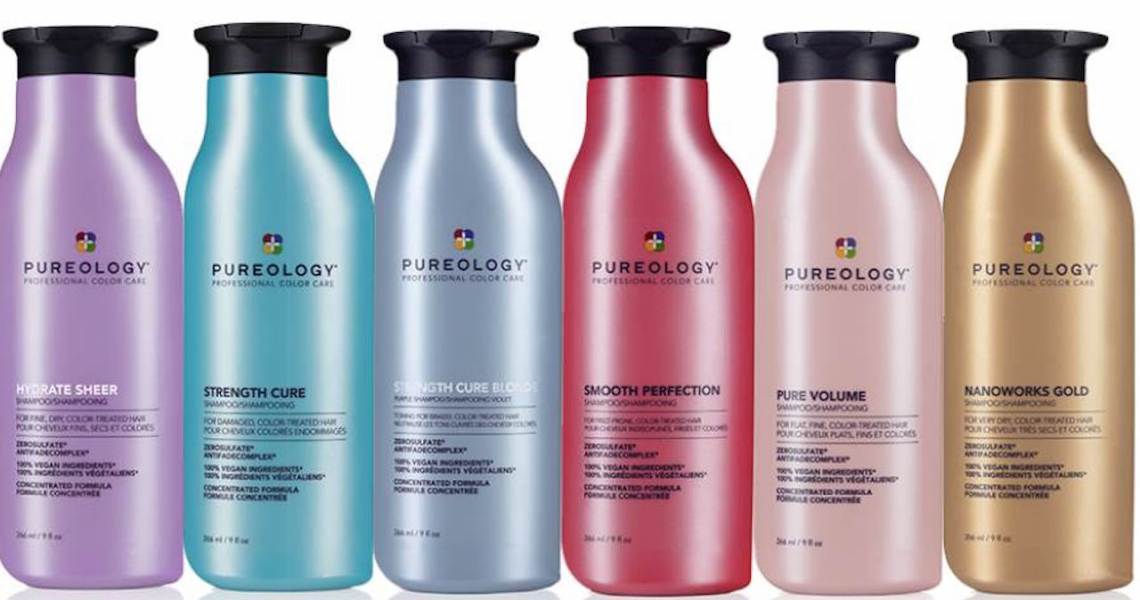L’Oreal Group-owned Pureology rolled out a relaunch on Wednesday to correspond to the changing clean hair-care category.
Pureology first launched in 2001 and was acquired by L’Oréal in 2007; it has a history as a professional sulfate-free brand. It last attempted a refresh in 2015, which introduced its color-coded packaging, but the hair-care category has changed substantially since then. Namely, sulfates are no longer the only no-no ingredient in clean hair care. as the clean category has grown in the last five years. Purelogy is now trying to implement authentic, empowering and inclusive standards that all brands are trying to adopt. Pureology’s relaunch includes, in part, cleaner formulations, new packaging, a new tagline and a new approach to Instagram.
“[We are] going back to our roots and making sure that we regain our leadership in a space that’s trendy and alive today,” said Michelle Bancroft, Pureology digital manager.
Pureology’s formulas are now all 100% vegan, paraben-free, mineral oil-free and more concentrated to reduce water-usage within products. The brand reduced its product portfolio size by 30% to 30 products, while streamlining its categories based on benefits to: hydration, strength, smoothing, toning, volume, texture and hold. Pureology also changed its tagline from “serious color care” to “professional color care,” to communicate that the brand has authority and credibility in the clean color care space, said Bancroft.
Pureology’s relaunch plans were introduced to professional hairstylists in February, before a soft relaunch on Pureology.com in June and to a wider customer base on Wednesday. Pureology’s distribution is 50% though salons, and 50% through retailers and its site. In August, the brand will add Ulta, Amazon and Sephora.com as new retail partners. Bancroft declined to provide specific figures, but said the brand has a “record-breaking, double-digit growth projections for the next 18 months,” which will be tied to an increased investment in brand marketing activities. Pureology is part of the L’Oréal Professional Products Division, which experienced a 10.5% sales decline year-over-year in the company’s first quarter, according to an earnings report from April.
Much of the hair category’s recent evolution is inspired by the clean skin-care movement, according to Sarirah Hamid, founder of Pretty Analytics forecasting and trend agency. And Pureology is not the only heritage brand to revisit its branding and portfolio of late. In January, Frèdéric Fekkai launched a 15-product collection called Fekkai that is both clean and eco-friendly. Henkel launched its clean hair brand Authentic Beauty Concept through Ulta in April.
“The intelligent consumer base is well established. Consumers are more inclined to research products before they buy, and are open to learning how a particular formulation, ingredient or treatment can elevate their hair-care routine, which is similar to their approach to skin care,” she said.
Ad position: web_incontent_pos1
Pureology’s brand refresh also extends to its Instagram, which was the primary method for sharing the relaunch news with customers. Pureology has approximately 77,000 Instagram followers, and before the soft relaunch in June, it would post once a day — mostly highly stylized model hair shots. Now, the brand publishes up to twice a day with more lifestyle shots and relatable or achievable model hair photos.
“We’ve never had these kinds of visuals before,” said Bancroft. “[Our] Instagram [strategy] is a big step for us, and with our omnichannel distribution, it gives us a 360-degree brand and approach that other professional brands don’t necessarily have.”




